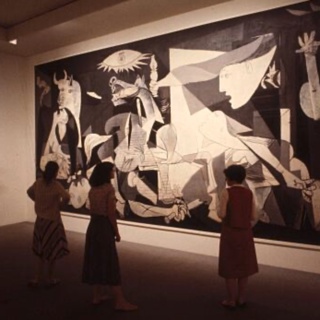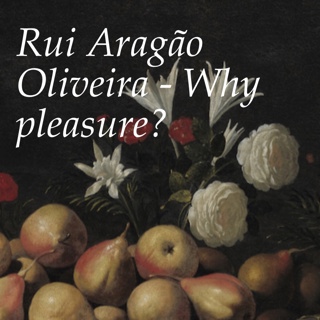
Rui Aragão Oliveira - Why pleasure?
Flowers and Fruit in a Chinese Bowl, c. 1645, Juan de Zurbarán. Courtesy Art Institute Chicago. What role does Pleasure occupy in human development? What influence did this theme have on the development of Freud's Psychoanalytic theory? What do we think in contemporaneity about the function of pleasure in the psyche? In this episode we have the pleasure of listening to Dr. Rui Aragão Oliveira with his article “Why pleasure?”. Dr. Rui provides an overview of the relevance of the topic for the very emergence of Psychoanalysis, addresses the role of pleasure in the dynamic-economic balance of the psyche and its development, discusses the relationship between people and pleasure in our current society and, finally, points out aspects of pleasure in the clinical work of the analyst. Dr. Rui Aragão Oliveira is a full member and training analyst of the Portuguese Psychoanalytic Society, the SPP, Phd in Clinical Psychology. He is the Chair of the SPP Teaching Committee and Past President of the SPP. He was editor-in-chief of the Revista Psicanalítica Portuguesa and also editor by the IPA of the international publication Psychoanalysis.Today. Link to the paper https://docs.google.com/document/d/1-LWo16_Lapji9PCqGOJ8d-AMztwT7twB/edit?usp=sharing&ouid=112457875385152358388&rtpof=true&sd=true This episode is available also in Portuguese
13 Feb 202219min
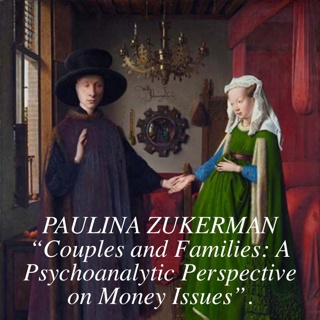
Paulina Zukerman: “Couples and Families: A Psychoanalytic Perspective on Money Issues”.
Phantasy knotted around money as a drive derivative organizes unconscious modes of family survival. Social, historical, political, and economic considerations also influence the conscious and unconscious establishment of alliances, pacts, agreements, and rules to govern family life. Is the re-drafting of laws enough to solve the permanent difficulties of equivalence when couples and families talk about money and assets? In this episode we will listen to Paulina Zukerman’s paper: “Couples and Families: A Psychoanalytic Perspective on Money Issues”, in which she considers unconscious stipulations to be an illusory attempt to lessen the uncertainty of otherness. She draws references to Freud, Isidoro Berenstein and René Kaës. Paulina Zukerman holds a PhD and is a full member and training analyst at the Psychoanalytic Association of Buenos Aires. She is the director and tenured professor for the Master’s Degree Program on Family and Couples at the University Institute of Mental Health of the Buenos Aires Psychoanalytic Association and in Maringa, Brazil. She has published in several psychoanalytic reviews and works in private practice in Buenos Aires. Link to the paper https://docs.google.com/document/d/1dCAV8MAr-v8unphRsv1psnjRUF-DcR2i/edit?usp=sharing&ouid=112457875385152358388&rtpof=true&sd=true This paper is also available in Spanish Paulina Zukerman has also published articles in psychoanalytic journals: “Apuntes para una psicopatologia de la economia cotidiana: El dinero en la clínica vincular” (2020): “Notes for a psychopathology of day-to-day home economics: money in clinical practice with linked patients.” Revista de Psicoanálisis de Guadalajara, N° 14, México. “Intimidad en los vínculos familiares. Reflexiones a partir de diversas investigaciones”. (2017) “Intimacy in family links”: IPA Congress. Revista Psicoanálisis. Vol. XXXIX, N° 1-2. “Sull'assimmetría nei patti e accordi familiari.” Family pacts and agreements: about asymmetry”: Revista de la Societá Italiana di Psicoterapia Psicoanalítica (S.I.P.P.)(2006). Zukerman PhD thesis, University of Buenos Aires, 2015: “Conceptual analysis of the relationship between unconscious pacts and agreements and the circulation of money in families and couples”. The Arnolfini Portrait, 1434, Jan van Eyck. Courtesy National Gallery, London.
5 Des 202121min
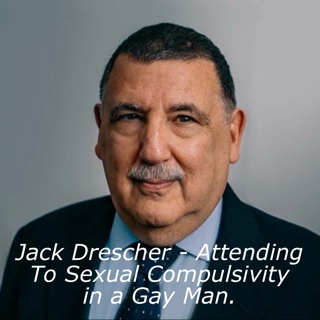
Jack Drescher - Attending To Sexual Compulsivity in a Gay Man.
Themes of hiding abound in the developmental narratives of boys who grow up to be gay. Their need to hide is reinforced by the traumatizing public humiliation that ensues from either open expressions of same-sex desire or gender- nonconforming behavior. The experience of being discovered, punished, and humiliated for showing or acting on such feelings or behaviors can lead to hiding activities that persist long after the actual trauma is forgotten. When open expressions of same-sex intimacy are driven underground, clandestine and forbidden sexual activities, highly tinged with interpersonal anxiety, may become a significant mode of relatedness. This papers offers a clinical psychoanalytic approach for working with gay men that distinguishes the concept of sexual compulsion from that of sexual identity. Harry Stack Sullivan’s conceptualization of dissociative defenses is useful in clinically understanding and therapeutically working with gay men in general, and with sexually compulsive gay men in particular. This approach allows the sexual identities of gay men to be respected while addressing the compulsive behaviors that some of them find so troubling. Jack Drescher is a psychiatrist and psychoanalyst in private practice in New York City, a Clinical Professor of Psychiatry at Columbia University and a Faculty Member of their Psychoanalytic program and their Division of Gender, Sexuality and Health. He is an adjunct Professor at the New York University Postdoctoral Program in Psychotherapy and Psychoanalysis and a Training and Supervising Analyst at the William Alanson White Institute. He also serves as a consultant to IPA’s Committee on Gender and Sexual Diversity. SELECTED PRESENTATIONS AND PUBLICATIONS Reed GM, *Drescher J, Krueger RB, Atalla E, Cochran SD, First MB, Cohen-Kettenis PT, et al. Revising the ICD-10 Mental and Behavioural Disorders classification of sexuality and gender identity based on current scientific evidence, best clinical practices, and human rights considerations. World Psychiatry, 15:205–221. Drescher J, Schwartz A, Casoy, F, McIntosh CA, Hurley, B, Ashely K, et al: The growing regulation of conversion therapy. Journal of Medical Regulation, 102(2):7-12. Drescher J, Cohen-Kettenis PT, Reed GM: Gender incongruence of childhood in the ICD-11: Controversies, proposal, and rationale. Lancet Psychiatry, 2016, 3:297-304. Drescher J, Cohen-Kettenis PT, Winter S: Minding the body: Situating gender diagnoses in the ICD-11. International Review of Psychiatry, 2012, 24(6): 568–577. Drescher J: Queer diagnoses: Parallels and contrasts in the history of homosexuality, gender variance, and the Diagnostic and Statistical Manual (DSM). Archives of Sexual Behavior, 2010, 39:427–460.
14 Nov 202115min
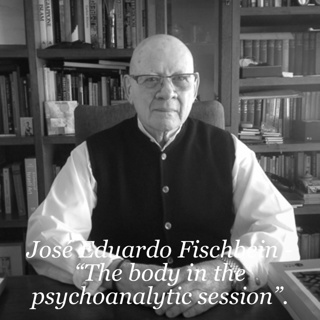
José Eduardo Fischbein - “The Body in The Psychoanalytic Session”.
This paper aims at categorizing two types of discourse with which the body is referred to. It is based on the model of psychic apparatus as presented in Chapter VII of The Interpretation of Dreams, using it as a conceptual instrument for reading the clinical material in the session. These are the discourse of the "evoked body" and the one on the "perceived body". The former historicizes memories and bodily experiences, while the latter alludes almost exclusively to the present of perception and the recording of what has been done. The discourse of the evoked body corresponds to the field of defensive formations—the expression of a conflictive situation for the mind—, in which different types of acting psychic defences can be distinguished. It is a discourse on the body constructed by representations of the oedipal linking framework. The discourse of the perceived body conveys a body that focuses on references to the perception of economic excitatory aspects; it is rich in its allusions to sensations and experiences that have their axis in bodily functions. It talks about the perception of well-being vs. discomfort, pain vs. absence thereof, increasing tension or discharge processes. Dr. José Eduardo Fischbein MD from the University of Buenos Aires, graduated with Honours Diploma. Specialist in Psychiatry, National Ministry of Health. Full Member and Training Analyst of the Argentine Psychoanalytic Association (APA), Latin American Federation of Psychoanalysis (FEPAL), International Psychoanalytic Association (IPA). Specialized in Child and Adolescent Psychoanalysis, APA, FEPAL, IPA. Master in Psychoanalysis, National University of La Matanza [UNLAM] Elected Director of the Department of Psychosomatics of APA in several administrations, most recently from 2012 to 2016. APA Vice President, 2018-2020 Chair of the Research Group "The body in the psychoanalytic session" (2010 - 2020) He has published numerous articles (approx. 65) in Argentine and foreign reviewed journals (Int. J. Psychol., Revista de Psicoanálisis, APA; Psicoanálisis, APdeBA), as well as chapters in several books. Link to the paper https://docs.google.com/document/d/1--skeUZx8K4J_T12BhbU5LG-FhALv8N1/edit?usp=sharing&ouid=112457875385152358388&rtpof=true&sd=true This episode is available also in Spanish
1 Nov 202127min
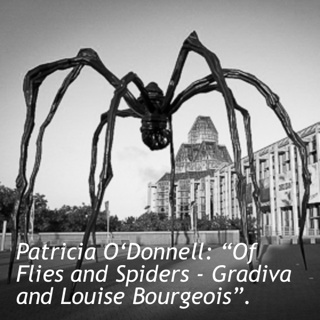
Patricia O‘Donnell: “Of Flies and Spiders - Gradiva and Louise Bourgeois”.
In this episode we come back to deal with Psychoanalysis and Art, through the work of Louise Bourgeois and a small novel very dear to psychoanalysis: "The Gradiva (a Pompeian fantasy)”, written by W. Jensen in 1903. Patricia O'Donnell presents her paper titled: “Of flies and spiders - Gradiva and Louise Bourgeois" and reports that a particular comment inside the book plus the added role of flies with their multiple meanings in the novel were the triggers for thinking about the French artist. "Maman", for instance, the gigantic sculpture of a spider in steel and marble, is the paradigm of a theme repeatedly evoked in the writings and works of the artist, who gave these attractive and fearsome creatures a variety of interpretations. This presentation, which explores and interweaves some biographical information, such as her mourning, the discovery of the difference between the sexes, her writings, her sculpture "Arch of Hysteria”, is an attempt to give us a glimpse into an artistic universe, which expands like a spider's web. The research into how she constructed the phantasmagoria around the spider constituted a psychoanalytical aesthetic experience with a body of work that invokes a past that travels through time in the face of an unknown future. Perhaps the spider as an apotropaic and talismanic figure is a defence against the fantasies of death and vulnerability that are so poignant in today's world. Patricia O'Donnell Psychiatrist and Psychoanalyst. Full Member and Training Analyst of the Argentine Psychoanalytic Association (APA). Member of the International Psychoanalytic Association. Coordinator of the APA Culture Commission (2017 - 2020). Associate Professor at the Department of Mental Health at the Hospital de Clínicas José de San Martín where she created and directed the Free Expression Workshop (2016 - 2020). She has begun psychoanalytic research into naïve art. She started her training in Psychoanalysis and Art with Dr. María Cristina Melgar, who together with Dr. Eugenio López de Gomara, were the pioneers, in 1960, of research into psychotic art in Argentina. She gave lectures and training sessions to the guides for the exhibition: “Louise Bourgeois. The return of the repressed” at the Department of Education in the Proa Foundation (2011). She has presented papers at national and international conferences; and publications, workshops and lectures on psychoanalytic art research in different academic fields. She was shortlisted as a finalist for the Lucian Freud Award, 2014 and is Secretary of the Redes Solidarias Foundation. She is the co-author of the books: “The New. Lucian Freud. A psychoanalytical reflection on the enigma of the body and the world". “Psychoanalysis and Art. From the psychoanalytic method to the encounter with the enigmatic in the visual arts”. “Topica. Literature and Cinema. Encounters with Psychoanalysis: Louise Bourgeois and the Arch of Hysteria”. “Women's Forum: Lee Miller”. Link to the paper https://docs.google.com/document/d/1GOyFfPvc9VEchdeuEcjSBbWWQu-tJuGP/edit?usp=sharing&ouid=112457875385152358388&rtpof=true&sd=true This episode is available also in Spanish
19 Okt 202142min
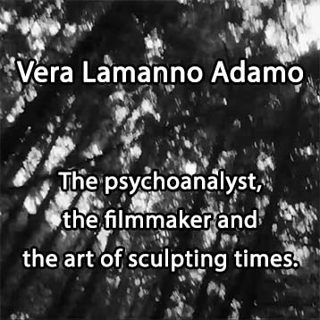
Vera Lamanno Adamo - The Psychoanalyst, The Filmmaker And The Art Of Sculpting Time.
How deep and historically grounded is the intertwining of cinema and psychoanalysis? In this episode, we'll listen to Vera Lamanno Adamo on the crafts of filmmaking and psychoanalysis as the art of sculpting time. She weaves correlations between the construction of a film and the analytic process, and draws a parallel between the history of cinema and the history of psychoanalysis. This episode refers to an article published in Calibán, Latin American Journal of Psychoanalysis, vl.18, n.2, 2020. Vera Lamanno Adamo is a training and supervising analyst of the Brazilian Psychoanalytic Societies of São Paulo and Campinas. She has published seven books. Her latest are “Work of the Negative”, “Living on the border: psychoanalysis and art”, “In Corners of Life Death Charms” (in Portuguese), and “Teresa Margarida: the audacity of a woman in the 18th century” (in Portuguese). In 2012, she received the Psychoanalysis and Freedom award from the Psychoanalytic Federation of Latin America for her contribution to the theoretical and clinical development of psychoanalysis, and in 2013 she received the Revista Brasileira de Psicanálise award. This episode is available also in Portuguese
5 Okt 202113min
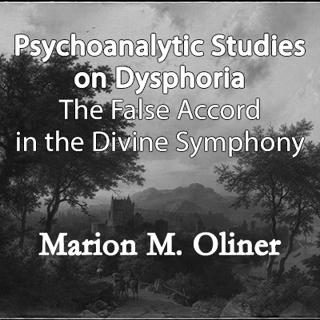
Marion M. Oliner - Psychoanalytic Studies on Dysphoria: The False Accord in the Divine Symphony.
What is the role of external reality in the formation of traumatic experiences? And how much does this still determine the overcoming of the profound dysphoria that affects certain individuals? With a highly personal and original view on the functioning of the mind from a psychoanalytic perspective, Marion Oliner accompanies us in this episode through a reflection on the impact of catastrophic events on the lives of individuals and th eir descendants. Through her voice we will encounter Diderot, Proust and Baudelaire, Grubrich-Simitis and Winnicott; the tragedy of Nazism and the memorable beauty of the vineyards along the Rhine. Marion M. Oliner has been active in her private practice, teaching, supervising, as a speaker, and as a member of many committees, as well as in the governance of the New York Freudian Society. She is a member of the International Psychoanalytic Association and on the faculty of the New York Freudian Society, the National Psychological Association for Psychoanalysis, and the Metropolitan Institute for Psychoanalytic Psychotherapy. This episode is inspired by the book published in 2018 by Routledge, titled: "Psychoanalytic Studies on Dysphoria: The False Accord in the Divine Symphony". link to the paper https://drive.google.com/file/d/1jUQ7U0ZAVNUS5TsWjxkCfv1UqDuJWG36/view?usp=sharing Sunset on the Rhine, 1853. Barend Cornelis Koekkoek. Courtesy Met Museum, New York.
23 Sep 202140min
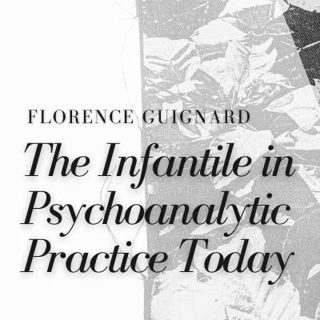
Florence Guignard - The Infantile in Psychoanalytic Practice Today.
One day, in 1996, with a leap from adjective to noun, a new concept arose within psychoanalytic thought: the Infantile. This term remained so pertinent over time that it has become the core of the title of the 52nd IPA Congress. Florence Guignard was the author who first formulated it in such an accomplished form, and in today's episode she draws important clinical consequences from the theoretical reflection on this concept concerning the analytic relationship and the interpretative activity of the psychoanalyst in their daily work. The Infantile -with a capital “I”- is a limit-concept, which aims at describing a "flexible" structure, at the limits of our animality, at the borders of our Unconscious and our Preconscious system. Being the first and main means of organization of our Ego drives, the Infantile is also the place of our primary fantasies and of the mnemonic traces of our first sensory-motor experiences. It is the most acute point of our emotions and feelings in their non-verbal state. Florence Guignard describes how the patient’s Infantile and the analyst’s Infantile are interweaving in the transference-countertransference situation, as beautifully illustrated by Mikael Vilchez artistic creation, enriched by Rhoda Bawdekar’s interpretation of it. Florence Guignard shows us how the Infantile can serve as a lever in the case of blind spots and stopper interpretations. A clinical example of a blind spot in the analyst will be published in the second volume of “Psychoanalytic Concepts and Technique in Development. The psychoanalyst in the city”. Florence Guignard is a Swiss and French psychoanalyst, Training analyst of the Paris Society and a direct member of the IPA for the Training in Child and Adolescent Psychoanalysis. She co-founded the European Society for Child and Adolescent Psychoanalysis. She is an internationally renowned author and since 1970 her work, translated into several languages, notably on female sexuality and the child, has contrìbuted significantly to the renewal of psychoanalytical thought. link to the paper https://docs.google.com/document/d/1UC1QF8Yirl8CZ5i42rWwTxvD5_qfwc5B/edit?usp=sharing&ouid=112457875385152358388&rtpof=true&sd=true This episode is available also in French Credits © Forbidden Denimeries by Mikael Vilchez, 2021 Visual editing and design, Rhoda Bawdekar Music, Chopin Ballade no. 4, Op. 52
12 Sep 202137min
